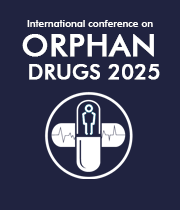Orphan Drugs 2025 _ Event Postponement
This is to inform that due to some circumstances beyond the organizer control, “2nd International Conference on Orphan Drugs and Rare Diseases” (ORPHAN DRUGS 2025) scheduled during March 13-15, 2025 in Rome, Italy has been postponed. The updated dates and venue will be displayed shortly.
Your registration can be transferred to the next edition, if you have already confirmed your participation at the event.
For further details, please contact us at orphan-drugs@magnusconference.com or call + 1 (702) 988 2320.
Rare Case Studies and Reports
Case reports, which are defined as scientific documentation of a single clinical observation, have a long and distinguished history in medicine and scientific publication. Case reports are a significant, timely, and relevant study design in the advancement of medical scientific knowledge, particularly in the field of rare diseases. While case study methodology has clear limitations in terms of determining treatment and developing new tests, the observation of a single patient can contribute to our understanding of the aetiology, pathogenesis, natural history, and treatment of particularly rare diseases, as well as the training of future junior investigators. In recent years, this type of scientific publication has come under fire from some in the medical scientific publishing community, and case studies have been pushed to the bottom of the research design hierarchy. Case reports are the simplest form of evidence, but they are also the first line of evidence because they are where new issues and ideas develop. The significance of the observation being reported will be obvious in a strong case report. A medical case report, often known as a case study, is a comprehensive account of a patient encounter. The most crucial part of a case report, and the reason you'd care to write one, is that the situation is sufficiently unique, rare, or intriguing that other medical professionals can learn from it.

Sergey Suchkov
The Russian University of Medicine & Russian Academy of Natural Sciences, Russian Federation
Vladlen Slepak
University of Miami, United States
Harsha Rajasimha
Jeeva Clinical Trials, Inc, United States
Vladlen Slepak
University of Miami, United States
Harsha Rajasimha
Jeeva Clinical Trials, Inc, United States
Sergey Suchkov
The Russian University of Medicine & Russian Academy of Natural Sciences, Russian Federation


Title : Emerging solutions for inclusive orphan drug clinical trials management
Harsha Rajasimha, Jeeva Clinical Trials, Inc, United States
Title : Ectopically expressed olfactory receptors as an untapped family of drug targets. Discovery of agonists and antagonists of OR51E1, an understudied G protein-coupled receptor
Vladlen Slepak, University of Miami, United States
Title : Personalized and Precision Medicine (PPM) as a unique healthcare model to secure the human healthcare and biosafety among childhood
Sergey Suchkov, The Russian University of Medicine & Russian Academy of Natural Sciences, Russian Federation
Title : Orphan and rare disease emerging as a global public health priority through the view of personalized and precision medicine: How to use the latter to revolutionize pediatric services
Sergey Suchkov, The Russian University of Medicine & Russian Academy of Natural Sciences, Russian Federation
Title : Personalized and Precision Medicine (PPM) though the view of reproductive healthcare, pediatric services and natural family planning: an option for clinicians and caregivers realize the potential of genomics-informed care to secure the individualized human biosafety
Sergey Suchkov, The Russian University of Medicine & Russian Academy of Natural Sciences, Russian Federation
Title : Democratizing ASO drug discovery at La Jolla Labs
Melissa Keenan, La Jolla Labs, United States